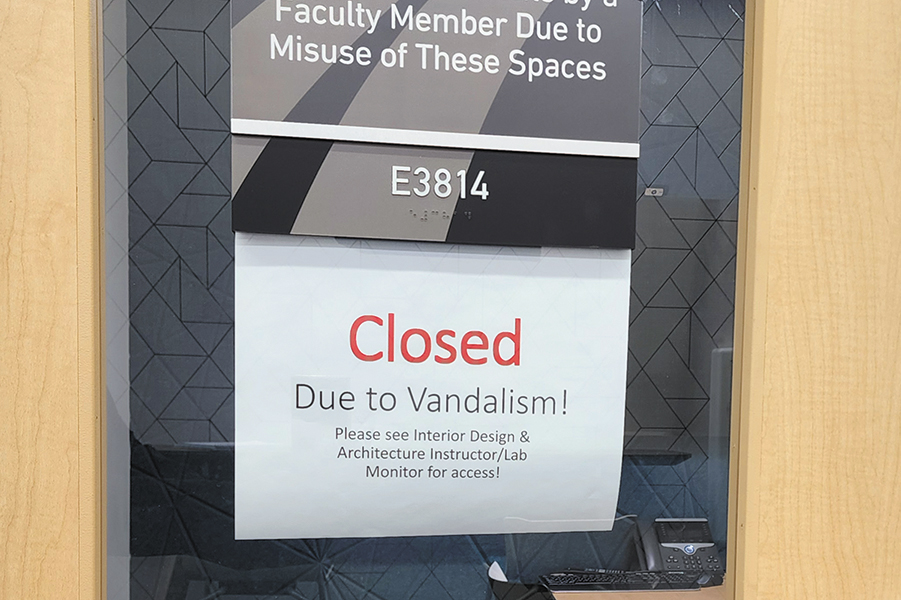Incidents of vandalism have impacted areas of the Madison College Truax building, raising concerns among custodial staff, facilities teams and faculty members.
Areas in the Truax Building face ongoing defacement, ranging from marking on the walls to cutting out pieces of acoustical paneling. Additionally, some damage includes the brazen removal of anchors whose purpose is to attach and hold the glass slats to the columns. This destruction strains the school’s finances and commitment to providing inclusive spaces.
Facilities Custodial Supervisor Bredell Mitchell Sr. was alerted one morning last fall about markings on the walls in the third-floor E-Wing room E3814, highlighting another incident in a troubling trend since the 2021 fall semester.
Despite being open for just a brief period after two remodels, the E-Wing faces continued vandalism, impacting various campus spaces.
Facilities Designer Ally Adams shed light on the financial implications of vandalism. Replacing cut-out pieces of acoustical paneling costs up to $15,000 and requires a contractor to remove and replace entire sections.
Adams, who is committed to establishing friendly spaces, expressed frustration due to the damaged areas. Repainting the study rooms resulted in limited entry because of ongoing harm, requiring permission from faculty or professors.
This preventative measure deviated from the original vision of maintaining continued direct access to these areas. This adjustment goes against Adams’ initial desire for a space accessible to all students, regardless of their program or circumstances.
Vandalism extends beyond the E-Wing, impacting bathroom stalls and elevator metal. It also includes individuals removing specially crafted metal support anchors from glass columns on the first floor. Dislodging the anchors that secure the glass slats to the columns poses a safety hazard and involves significant financial expenses for replacements, estimated from $100 to $200 per bag of anchors.
Carrie Stevens, a professional interior designer and instructor at Madison College, provided her perspective on the vandalism that led to the independent study rooms closure.
“The E wing was updated in the last couple years with some fantastic spaces for the students to use to focus, work in groups and study,” she said. “Our facilities department spends a great deal of time on planning and executing updates on campus to make these spaces great for the students.”
The incidents became the center of discussion in Stevens’ “Studio 4: Human-Centered Design” course. The class probes into the effects of constructed environments on individuals and involves in-depth research into how human functionality aligns with built environments—a valuable understanding with broad applications for students in their professional journeys.
The reopening of the independent study rooms, now with a fresh coat of paint, came at the perfect time for Stevens and her students.
“I held one-to-one meetings with students in one of the huddle rooms this week, and they noted how peaceful and quiet it is — ideal for concentrating on work or having one-to-one project critiques,” Stevens said.
Stevens expressed hope that closing these spaces would prompt a broader appreciation for well-designed environments.
This message aims to implore students to reassess their behavior and engage with shared spaces with the respect they rightfully deserve. These spaces were meticulously designed with students’ success in mind, involving teams dedicated to extensive research, ensuring the best possible campus experience for you.
When someone defaces that space, they deprive others of access, diminishing opportunities for students, undermining the collaborative effort to create an environment conducive for all.
Incidents of vandalism at Truax cause concern
Kylie Phillips, Assistant Editor
January 17, 2024
On-going vandalism in the fall resulted in the temporary closing of a student work space.
Story continues below advertisement


























